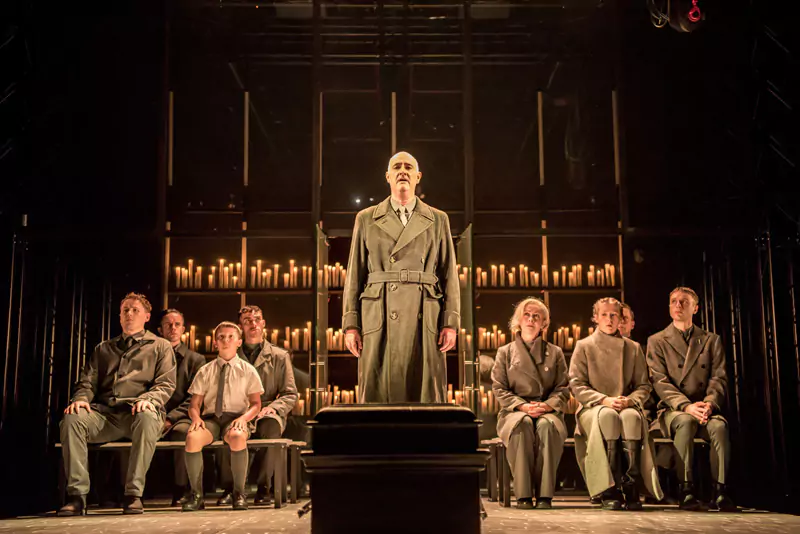“Titus Andronicus” at Hampstead Theatre
Neil Dowden in North London
26 September 2025
★★★★
One of his earliest plays – and his first tragedy – Shakespeare’s Titus Andronicus has mostly been regarded as an immature, apprentice potboiler that paved the way to richer fare. Its extreme, unremitting violence is certainly hard to stomach – even if you’re not a pie-eater – with Shakespeare perhaps jumping on the bandwagon of the popularity of gruesome revenge dramas at that time. And it is mixed with macabre humour that invites one to laugh at this ludicrous, over-the-top gore fest. But after centuries of neglect, the play has made a comeback in recent decades, so it is now staged fairly regularly (such as at the Sam Wanamaker Playhouse in 2023). No doubt this is because its horror chimes with the savagery we have seen in recent conflicts across the globe.

John Hodgkinson as Titus Andronicus.
Photo credit: Genevieve Girling.
This modern-dress RSC revival directed by Max Webster, first seen at the Swan Theatre in Stratford-upon-Avon in the spring, makes a powerful case for the play’s relevance today. Sadly Simon Russell Beale – who played the title role previously – was forced to withdraw from the London transfer due to ill health, but John Hodgkinson does a terrific job in replacing him in what is quite a coup for Hampstead Theatre. Played out on a thrust stage, this is a big, dynamic production that compels our attention with its blood-splattering brutality and unsettling humour – with the audience sitting in the front rows given blankets for protection in the second half.
Webster has skilfully trimmed Shakespeare’s text to give it a leaner narrative drive. Unlike his later Roman tragedies based on historical fact (however loosely), in Titus Andronicus Shakespeare gives full rein to his lurid imagination. But the bones of the story, specifically Titus’s gastronomic revenge, are inspired by ancient Rome’s own tragedy (Seneca’s Thyestes) and mythic poetry (Ovid’s Metamorphoses, with the Philomela tale the basis for the rape and mutilation of Titus’s daughter Lavinia). The latter is actually referenced in the play as a strange precursor of postmodernism. But then Titus Andronicus, with its sudden shifts between lyrical tenderness and bestial cruelty, tragic pathos and absurd comedy, is a disconcerting rollercoaster in which the ultimate revenge is a dish best served hot.
We see the victorious Roman general Titus having apparently seen off the enemy without – defeating the Goths after a ten-year war – then have to fight that same enemy from within as Rome declines from the civilized to the barbarous. He turns down the popular demand for him to become the next emperor in favour of the late emperor’s eldest son Saturninus who toys with Lavinia (already betrothed to his younger brother Bassianus who is his rival as emperor) before marrying the captive queen of the Goths, Tamora. It’s a fatal mistake from Titus who has just executed Tamora’s oldest son Alarbus as a prisoner (having lost 21 (!) sons himself during the war), thereby setting in motion a ferocious cycle of revenge.
After a brief sequence with Goths bounding across the stage, the show opens impressively with a ritualized end-of-war ceremony, as a coffin is borne on stage and a chorister (Titus’s grandson) sings against a backdrop of lighted candles. After the Goth prisoners are brought on stage Alarbus is dragged off and we hear his screams as he is torn asunder in sacrifice – but though this is intended to mark the end of bloodshed it is only another beginning. The political power struggle – in which soldier Titus is out of his depth, a bit like Coriolanus – is effectively staged with a microphone stand as the rivals address the audience as the Roman citizens, presided over here by Titus’s sister (Marcia) rather than brother (Marcus) as tribune. Webster has cut Titus’s killing of his own son whom he claims behaves treasonably towards the new emperor Saturninus. But the body count mounts anyway.
Body parts are presented as an unidentifiable pulp while severed heads are brought on in bloody plastic bags and Titus’s lopped-off hand is used for clapping in a grisly joke. There is liberal spraying of blood using a hose, with the stage stained red. The killings are stylized with protagonists gesturing towards each other with knives as their victims collapse covered in blood. Corpses then rise in zombie-like crouching mode as they exit to join the others like undead spirits. The superb movement direction from Jake Hackett also features the ensemble moving like the hunting hounds referred to in the play as everyone seems to become either predator or prey in an atavistic world without a human moral compass – or as Titus himself says “a wilderness of tigers”.
Webster (whose atmospheric Macbeth starring David Tennant and Cush Jumbo transferred from the Donmar Warehouse to the West End, while his revisionist The Importance of Being Earnest at the National Theatre has just opened in the West End with a new cast) somehow manages to tread the line between awfulness and absurdity in a show that is never dull or deadening. Joanna Scotcher’s set resembles an abattoir with frosted back windows, butcher’s hooks used for hanging up people, and a grille around the edge of the stage into which blood seeps, while her predominantly dark costume design is frequently daubed with red. Lee Curran’s lighting flickers with terror, while Tingying Dong’s discordant sound and Matthew Herbert’s sombre score add to the menacing ambience.
The cast – a mixture of new and survivors from Stratford – is strong. The excellent John Hodgkinson (an RSC stalwart) initially gives Titus a straight-backed military bearing and voice of authority as a loyal servant to Rome, but loses his faith in the empire (consorting with the Goths) and indeed his mental balance as his family is ripped apart. Emma Fielding is a supportive, pragmatic Marcia, Letty Thomas a piteously inarticulate Lavinia, and Joel MacCormack is Titus’s eldest son and future leader Lucius. Max Bennett plays Saturninus with a malevolent unpredictability, Wendy Kweh makes a fiercely combative Tamora, and as perhaps Shakespeare’s most irredeemable villain Ken Nwosu gives the Moor Aaron a sliver of humanity as he sacrifices his own life for that of the baby he has fathered with Tamora with his torturous end chillingly sealed by Titus’s young grandson.









